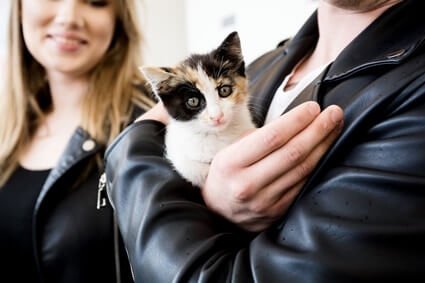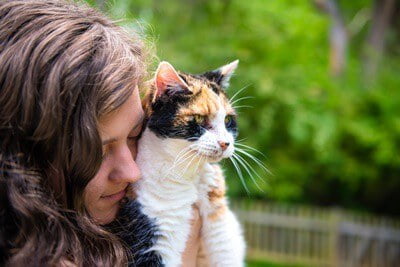Some cats just hate to be picked up. If you try to handle your cat, it may respond aggressively or try to get out of your reach. Although some felines are very receptive to being touched, others abhor it at all costs. They may associate it with pain and discomfort, or they may just value their personal space. No matter the case, if you use the right technique, you can safely pick up cats that dislike being held.
Start by watching the cat’s body language for signs of discomfort. If the cat has pinned-down ears or seems aggressive, wait until later. When the cat is calm, you should approach without making direct eye contact. Let the cat sniff you, and then slowly pick it up from behind its shoulders. Gently scoop up its back legs and hold the cat with both arms, pressing it gently to your chest.
Don’t try to hold its legs or restrict the cat’s movements. Keep it well-supported, and make sure your face is out of its claw-reach. As adults, cats never get picked up by other cats, so this may feel unnatural to the feline. Even if it trusts you, it may not understand why being picked up is necessary. It may even be afraid that you’ll drop it, and it won’t be able to catch itself, so always pick up cats carefully and with patience.
How Do You Pick Up A Cat That Doesn’t Like Being Picked Up?
Most adult cats do not like being picked up. Even so, there are times you must handle your cat whether they like it or not. For instance, you may need to pick up and hold your cat when taking it to the vet or bathing it. Sometimes, picking up your cat may save its life in certain situations.
With this in mind, learning how to pick up a cat that doesn’t like being picked up is crucial. Here’s the correct way to do it so that you can minimize stress and scratches:
- Check the body language of your cat. Avoid lifting cats with flattened ears and low tails, as this is a sign of apprehension or anxiety.
- Approach the cat slowly while avoiding direct eye contact.
- Allow it to sniff you for a while as you pet its head.
- Keep the claws of the cat a safe distance from your face to avoid accidental or deliberate scratched.
- If the cat is receptive, use one hand to lift behind the front legs.
- Meanwhile, scoop the back legs with the other hand.
- Rest the cat against your chest.
- Make sure the cat is level and in a comfortable position.
Why Doesn’t My Cat Like Being Held?
Sometimes cats dislike being picked up. This isn’t true for all felines, and some may be highly receptive, but you can’t assume. Doing so may result in a painful scratch.
Before attempting to pick up your cat, find out why it’s not receptive to your advances. Knowing the reasons behind its dislike can help you to learn the best way to handle your cat. It may dislike snuggling or being held because of:

Previous Mistreatment
If your cat is adopted from a previous home or used to be a stray, there’s a higher chance of it refusing to be held. Cats have very sharp memories, according to the Society of Neuroscience. If previous owners mistreated the cat or humans were cruel to it while it lived on the streets, it might distrust people. Even if it learns that it’s safe in your home, being touched or picked up could always seem dangerous or risky to the cat.
Stressful trips to the vet may also cause your pet to shun being held. After all, the last time you picked it up, the cat didn’t have a fun time or go to a fun place.
A Painful Injury or Medical Condition
Sometimes a cat dislikes being held because of a painful injury or an underlying medical condition that you are yet to notice. This is particularly true if your cat loved being held before but now dislikes it. Picking and holding an injured cat may result in great discomfort. Even once the injury heals, the cat may always associate being held with pain.
Feelings of Disrespect or Humiliation
If you must hold your cat, then you have to do it on the cat’s terms. Some felines consider any form of handling, except petting, to be disrespectful.
Cats that weren’t handled as kittens, or strays that are used to being very independent, may see getting picked up or held as completely unnecessary. They instead choose to perch up high on their own and treat you callously if you dare to touch, move, or lift them.
Anxiety or Apprehension
Some cats are naturally more jumpy or apprehensive than others. It’s possible your cat doesn’t understand why it’s being picked up and fears the unknown. Once cats reach adulthood, they’re never picked up or moved around by other cats, unlike when they were young. As such, your cat may view handling as strange, unnecessary, and therefore terrifying.
Motherly Rejection
Kitties are picked up by their mothers all the time and learn about handling at a young age. However, if your cat was rejected by its mother, it’s likely to become aggressive when held as an adult. It doesn’t understand why it’s needed, doesn’t associate it with motherly affection, and places its personal space in very high regard. If this is the case, you have to train your cat to like being held.
Restricted Movement
Depending on how you lift your cat, it may feel that you’re binding up its legs. Even if it trusts you, it may be worried that you’ll drop it at a bad angle or restrict its movement when it needs the most. Should it fall, need to escape, or need to reposition itself, it’s impossible. Time to squirm and scratch. In this case, it’s best to learn how you should properly hold a cat so it doesn’t feel restricted. A cuddle doesn’t need to rob your cat of its independence.
Cat Suddenly Doesn’t Want To Be Picked Up
What if your cat used to love being held but suddenly doesn’t want to be picked up? Then it means the cat is likely battling with an injury or a medical condition, like arthritis. Cats cannot speak words, so their only way of communication is through vocalization and body language.
In this case, try to investigate if your kitty has any injuries or underlying conditions. A sick or injured cat will always yowl, howl, or meow at night persistently to show that it’s in distress. You may have to take your cat to the vet if there are no visible injuries or symptoms.
Aside from that, cats develop a sudden aversion to being held if they have a bad experience. Maybe you or another family member held the cat the wrong way, and now it doesn’t like cuddling anymore. Felines are choosy when it comes to places you can touch. You should never loom over your cat, snatch it up from behind, or grab the cat by its legs.
The dislike for handling may also be temporary. Cats may suddenly refuse to be handled if it’s at the wrong moment. For example, if the cat is preoccupied with playing, stalking a toy, or staring out the window. If you interrupt this, the cat will likely fight you or try to squirm out of your grip.
Cat Doesn’t Like Being Picked Up Anymore
Cats are cute and cuddly, particularly when they are young. At this age, you can pick up and pet your kitten with ease. Once your cat becomes an adult, however, you might notice that it doesn’t like being picked up anymore.
This can be extremely confusing, especially if you don’t know why or how to fix it. Here are a few possible reasons why your cat refuses to be picked up at all:
Personality Changes
As your cat grows older, its personality also changes. Sadly, it is no longer the little kitten you used to carry around nonstop. Believe it or not, cats do experience personality changes, according to PLOS ONE. The main reason for this sudden behavior is hormones. They encourage a feline to be more independent and choosy about its space and companions.
The cat may still love you but want to establish firm boundaries on how anyone enters its space. Elderly cats may also avoid being touched and picked up following the onset of feline dementia.
Physical Punishment
If you discipline your cat with physical force, it may learn that you are a dangerous creature to be near. Some cats will refuse to approach you at all. Others will still love and interact with you, but understand that it’s a risk to be completely at your mercy. That will make handling, cuddling, or being picked up entirely off the table.
It’s far better to use other methods of disciplining a cat. By doing so, it won’t begin to associate you with pain and physical attacks, no matter how gentle or necessary you believe the smack is.
Lack of Care And Affection
Your busy work or school schedule might limit the amount of time you spend with your cat. However, your pet doesn’t understand these reasons. Instead, it feels abandoned.
If you deprive your cat of the love, care, and attention it deserves, it’s likely to turn cold and aggressive. That’s especially true if you try ‘unnecessary’ things, like picking it up. “Why should it be so trusting of you?” the cat may assume.
Reaction To Strange Scents
The smell of your new perfume or lotion could be a reason why your cat dislikes being picked up now. Cats have a strong sense of smell, and they can easily pick up new odors from a distance. If you smell unpleasant, odd, or the scent is particularly strong, your cat may want to distance itself from that odor.
Emotional Trauma
Cats do have feelings, and they also go through emotional stress and depression. Any stressful situation may cause your once-affectionate cat to avoid being touched or picked up suddenly. Has your cat recently been injured, really scared, or left alone for multiple days? Then this could be the reason.
Strange Faces in The Home
Have you recently thrown a party with several people? Did you introduce a roommate to the home? Have you moved back in with your family? In these cases, your feline may have a period of time where it dislikes being picked up.
Some cats are very selective when it comes to interacting with kids and strangers. If your cat felt overwhelmed by all the new faces, it may want to isolate itself for multiple days. At the bare minimum, it may want to protect its personal space and refuse to be handled. This feeling might be exacerbated to the point of aggression if the cat was picked up by someone it didn’t know.
My Cat Doesn’t Like To Be Touched
If you add a new cat to your home, it may refuse to be touched, no matter the situation. Even if you don’t pick it up, the cat may run away from petting, touching, or even scritches behind its ears.
That doesn’t mean you have a rude or unaffectionate cat. It also doesn’t mean that your cat was abused by its previous owner. Instead, consider if the feline hates being touched because of:
A Lack of Socialization
The way a cat is raised deeply impacts its willingness to be touched or pet by humans. Perhaps it:
- Wasn’t handled at a kitten
- Hasn’t interacted with people before
- Hasn’t been exposed to multiple cats before
- Doesn’t understand its new home or environment
If your cat hasn’t been properly socialized, it will place great value on its own personal space. That will make it difficult ever to touch or handle your cat unless you socialize it.
Touching The Wrong Places
Perhaps your cat does like being touched, but you are just petting the wrong places. Cats have specific areas of their bodies (like their feet and paws) that are off-limits. If you want to pet your cat, consider touching:
- Under the chin
- Behind the ear
- Around the neck
Type of Breed
Some cat breeds, like Bengals and Abyssinians, hate being touched. Many people consider them aggressive and temperamental. You can try respecting the cat’s boundaries or slowly teaching the cat to enjoy petting.

Is There A Wrong Way To Pick Up A Cat?
There is a wrong and right way to pick up a cat. If you handle the cat improperly, it’s likely to resist or become aggressive. Here are tips on how not to pick up a cat:
- Do not snatch up or grab your cat from behind
- Avoid picking up a cat with one hand
- Do not approach your cat head-on with your eyes wide open
If you pick up cats like this, they will feel surprised, unsafe, and threatened. Instead, be sure to approach slowly, let the cat know it’s about to be picked up, and support it at all times.
How To Train A Cat To Be Picked Up
Your cat might not like being picked up, but you can train it to look forward to being handled. Here are some tips:
- Help the cat get used to you by interacting with it more often. You can achieve this by using toys.
- Gauge the mood of the cat before attempting to pick it up.
- Once you feel the cat is comfortable, approach your cat calmly and allow them to sniff you. This allows it to identify you through scent.
- Pick up the cat with both arms and place it against your chest.
- Offer special treats and toys to your cat after every pick-up training session.
Cats may dislike being picked up, but you can train them to like being handled. Just do so patiently and over time. It needs to be on the cat’s terms, but it will learn to trust you as long as you don’t rush it.


I truly enjoyed the “tipsy” article (if I may call it that). Rambo has yet complied to be picked up. He is some 5 years old. I try to gently pick him up while sitting down and hold him close, but you can feel his body tense and can’t wait to be down on his own terms.
Rambo has allergies, as well. I sometimes think he is allergic to his self. His droplets are clear water. I do think it is the small grains in his dry food causing the reaction. He is an insider, so it isn’t grass. Thanks so much!